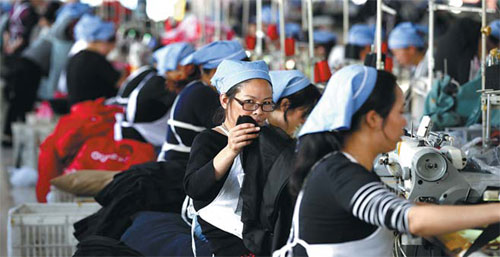Province eyes stronger legal protection for women at work
Proposal praised but critics say rule removes privacy and opens doors to discrimination
Proposed regulation entitling women to maternal benefits and paid leave while on their menstrual cycle has given birth to renewed debate about whether such measures can stand up to workplace discrimination.
The regulation, drafted by the provincial government of Guangdong and currently open to a public consultation exercise, says women suffering serious menstrual cramps will be able to enjoy one day of paid leave each month. One doctor's note will guarantee the paid leave for half a year.
Women have also been promised more legal protection during pregnancies, menopause as well as perinatal and lactation periods.
For instance, women diagnosed with menopause will be able to apply to have their workload lightened, and new mothers will be able to enjoy paid leave until their baby reaches 1 year old. Currently, Chinese women are entitled to a maximum of 98 days off from work around their delivery.
Many doctors have praised the regulation as progress in women's rights.
Huan Qingshan, with the Guangzhou Women's and Children's Medical Center, said work stress is one cause of menstrual cramps, or dysmenorrhea.
Nearly 80 percent of Chinese women suffer dysmenorrhea, according to a report by Peking University this year, which also said 14 percent of women found the pain to have a disrupting effect on their lives.
"Lightening women's workload during dysmenorrhea by promising vacations is therefore proof of social progress," Huan said.
This is not the first time China has introduced short vacations for dysmenorrhea. A regulation passed by the central government in 1993 required paid leave of one or two days for women suffering serious menstrual cramps. Several provinces, including Hubei, Shanxi and Anhui, have issued similar policies.
Though the Guangdong provincial policy has been praised for its practicality, there are concerns that, as in previous attempts, women employees will still be reluctant to push for their rights.
One misgiving is privacy.
"Handing a dysmenorrhea diagnosis to my boss to demand time off is very embarrassing, and I don't want all my colleagues to know about this," said Wang Yao, who works with a State-owned enterprise in Guangdong.
But lawyers said the real obstacle is fierce competition and sexual discrimination in the workplace that forces women to relinquish their entitlement.
"Many employers will fear that time off for menstrual cycles, if made a legal right, will add to their management burden and affect operations," said Lu Dixin, a Guangdong-based lawyer, adding that many women might give up this right to avoid offending their employers.
"The regulation does not have penalties for employers who refuse to abide by it," Lusaid. "The low cost of violation may make the idea of dysmenorrhea vacations abortive."
|
Women employees work at a garment factory in Huaibei, Anhui province. A draft regulation by the Guangdong provincial government would give women paid leave one day a month while on their menstrual cycle. Xie Zhengyi / for China Daily |
(China Daily 11/13/2015 page10)















